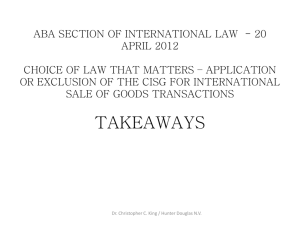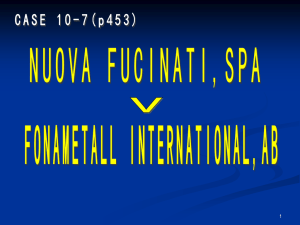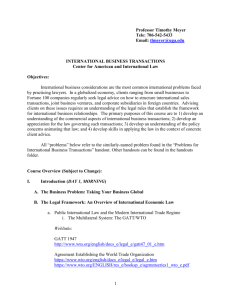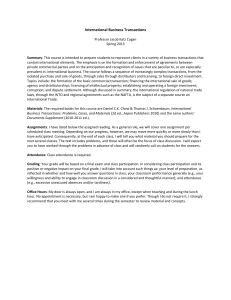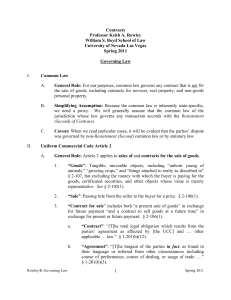remedies of the buyer under the cisg
advertisement
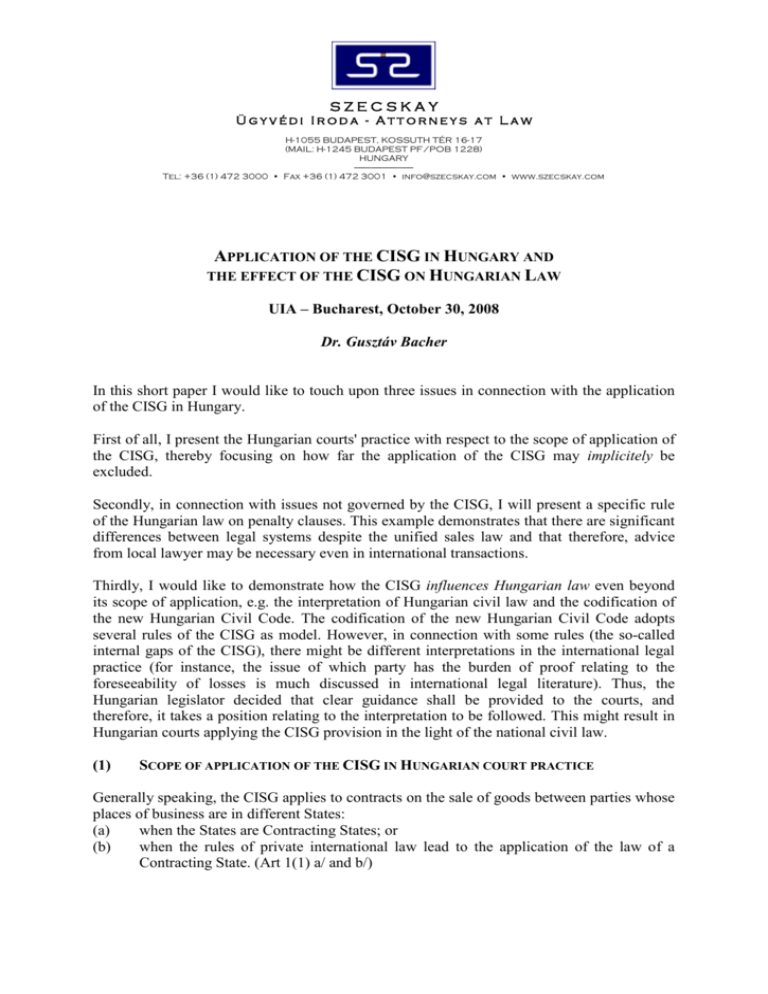
SZECSKAY Ügyvédi Iroda - Attorneys at Law H-1055 BUDAPEST, KOSSUTH TÉR 16-17 (MAIL: H-1245 BUDAPEST PF/POB 1228) HUNGARY --------------------------------Tel: +36 (1) 472 3000 • Fax +36 (1) 472 3001 • info@szecskay.com • www.szecskay.com APPLICATION OF THE CISG IN HUNGARY AND THE EFFECT OF THE CISG ON HUNGARIAN LAW UIA – Bucharest, October 30, 2008 Dr. Gusztáv Bacher In this short paper I would like to touch upon three issues in connection with the application of the CISG in Hungary. First of all, I present the Hungarian courts' practice with respect to the scope of application of the CISG, thereby focusing on how far the application of the CISG may implicitely be excluded. Secondly, in connection with issues not governed by the CISG, I will present a specific rule of the Hungarian law on penalty clauses. This example demonstrates that there are significant differences between legal systems despite the unified sales law and that therefore, advice from local lawyer may be necessary even in international transactions. Thirdly, I would like to demonstrate how the CISG influences Hungarian law even beyond its scope of application, e.g. the interpretation of Hungarian civil law and the codification of the new Hungarian Civil Code. The codification of the new Hungarian Civil Code adopts several rules of the CISG as model. However, in connection with some rules (the so-called internal gaps of the CISG), there might be different interpretations in the international legal practice (for instance, the issue of which party has the burden of proof relating to the foreseeability of losses is much discussed in international legal literature). Thus, the Hungarian legislator decided that clear guidance shall be provided to the courts, and therefore, it takes a position relating to the interpretation to be followed. This might result in Hungarian courts applying the CISG provision in the light of the national civil law. (1) SCOPE OF APPLICATION OF THE CISG IN HUNGARIAN COURT PRACTICE Generally speaking, the CISG applies to contracts on the sale of goods between parties whose places of business are in different States: (a) when the States are Contracting States; or (b) when the rules of private international law lead to the application of the law of a Contracting State. (Art 1(1) a/ and b/) It is also possible to exclude the application of the CISG (Art. 6) (“opting out”). If the exclusion is explicit, the choice of law clause is clear. The real problems start if one of the parties argues that the application of the CISG has implicitly been excluded. Such an implicit exclusion may be at least doubtful if: (i) the parties have chosen the law of a Contracting State; (ii) the parties have referred to a special legal instrument, e.g. the civil code of a Contracting State. It is possible to say that in such cases the intention of the Parties to exclude the application of the CISG should be clear and should be respected. However, many commentaries and cases adopt a different approach which favours the application of the CISG. I would like to present how the Hungarian courts rules on these issues. 1.1 Choosing the law of a Contracting State CASE No. 11 A Hungarian claimant (Seller) and the Italian defendant (Buyer) entered into a "Distributorship Agreement", which contained elements typical for sale and for agency agreements. The agreement provides: “Any lawsuit shall be decided according to the substantive law provisions of Hungary”. The Hungarian Court of Arbitration had to decide whether the CISG was applicable in this case. The agreement was a framework agreement where the characteristics of an agency dominated. The individual agreements entered into between the parties on the basis of the framework agreement qualified as sale contracts. The arbitration court established that the parties had not declared their agreement in the title of the agreement as sale and purchase agreement, and although they did not exclude its nature of being a sale contract, they did not considere the elements of a sale contract dominant and characteristic to their relationship. The parties therefore had to take into consideration that (i) the rules on different types of contracts and in addition, (ii) general contractual rules might be applicable, and therefore, they might have found it necessary to clearly define the applicable law in their contract. Such choice of law cannot be interpreted as choosing the rules on sales contract of the Hungarian Civil Code with the exclusion of CISG, but only as the parties’ decision to clarify which law will be applicable to the complex legal relationship. The arbitral tribunal held that since the "Distributorship Agreement" contains elements of sale and agency as well, it is necessary to examine the applicability of the CISG separately for the different types of contracts. As far as the framework contract is concerned, the CISG is not applicable since this agreement qualifies as an agency agreement. On the other hand, the individual agreements qualify as sale contracts. The Court stated that the "choice of law clause" of the contract does not expressly exclude the possibility of the applying the CISG, since the CISG itself is a part of the Hungarian civil law, thus it cannot be interpreted as the stipulation of the application of the Civil Code instead of the CISG. Therefore the Court ruled that the CISG is applicable to the individual contracts of sale which are to be concluded pursuant to the framework agreement, and the 1 Case VB 1997/10, Arbitration Court attached to the Hungarian Chamber of Commerce and Industry; published in Hungarian: BH 1997/10; CLOUT 174, English abstract available at: http://daccessdds.un.org/doc/UNDOC/GEN/V97/274/84/PDF/V9727484.pdf?OpenElement . 2 frame agreement itself is to be judged by the provisions of Hungarian civil law, since that does not fall within the CISG's scope. The Court also argued that the CISG is that particular part of Hungarian civil law which is most suitable for governing international sale of goods contracts. On the other hand, the court shall avoid applying the CISG to agreements which do not fall within the scope of traditional sale contract. This decision corresponds to that of the German courts. There are numerous decisions which rule that if the parties choose the application of the national law of a Contracting State, it does not lead to the exclusion of the CISG, since it is itself part of the national law. 2 1.2 Referring to the Civil Code of a Contracting State CASE No. 23 The Hungarian Supreme Court adopted the same approach in the case where the claimant and the defendant entered into a supply contract, by which the Hungarian seller (the plaintiff) delivered sunflower seeds to the Polish buyer (the defendant). The parties stipulated the application of the Civil Code of Hungary. After the completion of some deliveries a legal dispute arose regarding the payment of the arrears of the purchase price. The Hungarian Supreme Court applied the CISG in spite of the parties' express stipulation of the Civil Code. The Court argued that although the exclusion of the CISG may happen tacitly, the interpretation of the intention of the parties requires strong evidence that they in fact wanted to exclude the CISG despite the fact that they did not explicitely do so. “The application of CISG can be excluded by an implicit agreement, however the defendant denied that the parties’ declaration, according to which the questions not regulated by the contract are governed by the Hungarian Civil Code, leads to the implicit exclusion of the Convention. Since the parties are in a position to expressly exclude the application of the Convention, - and if they fail to do so - their intention has to be interpreted more strictly. There was no data available in the course of the litigation which could confirm that the parties referred to the provisions of the Hungarian Civil Code [..] in order to exclude the Convention and stipulate the exclusivity of the Hungarian Civil Code. The fact that in the choice of law clause the parties referred to the Hungarian Civil Code instead of the Hungarian law does not mean - according to the phrasing as well - the exclusion of the application of the Convention. It is evident that in case of civil law relations the parties are referring to the specific law which governs their relation and not to the Hungarian law in general, especially when their contract contains provisions which are not covered by the Convention. [..] Therefore it can not be verified that the parties excluded the application of the Convention by mutual consent. If they did not exclude its application, the Convention is applicable to all matters on which it contains specific provisions and, only in the lack of any respective provision of the Convention, can the Hungarian Civil Code be applied.” Consequently, in the given case the court established that the buyer was entitled to suspend payment under Art 71 CISG due to the failure of the seller to deliver the agreed installments of the supply, and as consequence, established by applying the Hungarian Civil Code that the seller shall pay contractual penalty which the buyer can set-off into the purchase price. 2 http://cisgw3.law.pace.edu/cases/950405g1.html; " The mere agreement that German law applies would not be sufficient according to the prevailing opinion on the application of Art. 6 CISG." http://cisgw3.law.pace.edu/cases/011022a3.html; http://cisgw3.law.pace.edu/cases/991227g1.html "…choice of Dutch law would have to be understood as a reference to the entire Dutch law, including the CISG, which takes precedence over the Dutch provisions for domestic commerce." 3 Gfv.IX.30.372/2007/5, Hungarian Supreme Court. 3 This argument is contested by the Hungarian legal literature4, which would regard the stipulation of a particular provision of law of a particular state (the stipulation of the Civil Code of Hungary in this case) as an implicit exclusion of the application of the CISG. OLG Frankfurt adopted a further different interpretation in comparision to the Hungarian Supreme Court in this question5. The German Court found that only if the parties had referred more specificly to the domestic Swiss code, this would have constituted an implicit exclusion, thus it is sufficient that the parties name a particular code of law in their choice-oflaw clause. An effective agreement to apply Swiss national law would require that the relevant Swiss Code was named. Otherwise, the parties did not validly exclude the application of the CISG through the clause "all transactions & sales are subject to Swiss law." Due to its ambiguous wording this clause cannot lead to an exclusion of the CISG, as the CISG is Swiss law. It seems that this later approach corresponds to the intention of the parties more than the broad application of the CISG adopted by the Hungarian courts. 1.3 Exclusion of the CISG under Hungarian law - Summary The Courts in Hungary interpret the possibility of exclusion very strictly. According to the arguments cited above, the exclusion of the applicability of the CISG must be express; it is not sufficient that the contracting parties chose the application of the law of a Contracting State or even a particular domestic provision of law thereof: they have to state that it is chosen instead of the CISG.In light of this, it seems that the implicit exclusion of the CISG is hardly possible at all under Hungarian court practice. (2) LIMITED SCOPE OF THE UNIFIED LAW - ISSUES EXCLUDED SCOPE: VALIDITY, PROPERTY AND OTHER ISSUES 2.1 Issues not governed by the CISG FROM CONVENTION’S Having established that the subject matter of the contract is an international sale of goods and that it falls under CISG, the tribunal shall next ascertain whether the substantive provisions of the uniform law actually govern the issue in dispute. The unification of sales law is limited in scope. The Convention is designed to govern only the formation of the sales contract (part II) and the rights and obligations of the seller and the buyer arising therefrom (part III); it is not designed to govern (most) validity questions or 'property' questions relating to the rights of third partes. It must be noted that there are a lot of other issues which, although not expressly excluded from the Convention’s scope of application, are nevertheless not governed by the CISG. These matters, i.e. those not governed by the CISG (to which some refer as “external gaps” or “lacunae intra legem” and others simply as “issues not governed by the CISG”) must be kept distinguished from the matters governed by the Convention but which are not expressly settled in it, generally referred to as “internal gaps” or “lacunae prater legem”. This distinction is necessary as the different types of gaps are addressed differently. Whereas the 4 5 Sándor, Tamás - Vékás, Lajos: Nemzetközi Adásvétel [International Sale of Goods], Budapest, 2005, p. 65. http://cisgw3.law.pace.edu/cases/000830g1.html 4 “issues not governed by the Convention” are to be filled by resorting to the applicable law by virtue of the rules of private international law of the forum, the “internal gaps” “are to be settled in conformity with the general principles on which the Convention is based. Please find below a non-exhaustive list of issues not governed by the Convention upon which the tribunal shall decide by resorting to the applicable law by virtue of the rules of private international law of the forum: - validity and scope of penalty clauses; validity of clauses limiting or excluding liability; use of standard contract in the formation of the contract; validity of choice of law clause; set-off; statute of limitations; agency; validity of settlement agreements; legal capacity or whether a company has legal personality; assumption of debts; validity of the establishment of a bank guarantee in favor of the seller; etc. 2.2 Claiming damages in excess of the penalty under Hungarian law In the contractual practise, it is common to specify a sum (liquidated damages or penalties) to be paid for non-performance, or delay in performance, or defective performance, with a view to avoiding the difficulty, delay and expense involved in proving the amount and the foreseeability of loss. As the CISG does not contain any provision concerning penalty clauses, the question of validity of the penalty clause is to be settled in conformity with the law applicable by virtue of the rules of private international law. Section 246 of Hungarian Civil Code regulates penalty as follows: (1) An obligor may undertake to pay a certain sum of money in case he fails to perform the contract or his performance is not in conformity with the contract for reasons attributable to him (penalty). A clause stipulating penalty shall only be deemed valid if made in writing. Any interest attached to penalty shall be null and void. (2) The obligee shall be entitled to demand payment of penalty even if he suffers no damage, and he shall be entitled to enforce payment for those of his damages exceeding the penalty as well as other rights resulting from the breach of contract. The obligee shall be entitled, in accordance with the relevant regulations, to demand compensation for damages caused by the breach of contract, even if he has not enforced his claim for penalty. (3) Enforcement of penalty stipulated for nonperformance precludes any demand for performance. Payment of penalty stipulated for late performance and lack of conformity shall not constitute an exemption from performance. However, the Hungarian legal system contains specific rules for the application of the Civil Code in international commercial relations. Such specific rules originate before the period of the free market economy; however, they are still in force. Such specific rules provide that in case of breach of contracts within international commercial relations, the loss exceeding the penalty cannot be enforced (Section 10 of Law Decree No. 8 of 1978 on the application of the 5 Civil Code to foreign commercial relations). Therefore, if the parties to an international sales contract provide for penalty payment, they shall be aware of the circumstance that the loss exceeding the penalty cannot be enforced if – beside the CISG – the Hungarian law is applicable to the contract. Hungarian law can be applicable either (i) on the basis of choice of the parties, or (ii) on the basis of the conflict-oflaw rules of the forum (i.e. generally, the seller’s law is applicable to the sales agreement, as the law of the party who is to effect the performance which is characteristic of the contract). Consequently, the legal adviser to any person who enters into the sales contract with a Hungarian seller shall call attention to this rule limiting the claim for damages beside a penalty clause. (3) INFLUENCE OF THE CISG ON HUNGARIAN LAW The CISG influences Hungarian civil law even beyond its scope of application. I would like to mention two such areas: (i) interpretation of Hungarian law in light of the CISG, (ii) the system of liability in the new Draft Hungarian Civil Code based on CISG model. 3.1 Interpretation of Hungarian law in light of the CISG CASE No. 36 The next case shows how the CISG influences the interpretation Hungarian law: the Convention was applied to a case which did not have any international aspects, however, the court referred in the purely domestice to the CISG in its reasoning. The plaintiff buyer ordered 4,000 tons of corn from the defendant seller. The seller was not able, due to the breach of contract by its own supplier, to deliver this amount. The buyer informed the seller on the avoidance on April 23, 1996 and undertoook two cover transactions two months later, in June 1996. He claimed damages on the basis of cover transactions. The Hungarian court stated that Hungarian civil law does not contain any specific rules on damages on grounds of cover transactions. However, the CISG and the PECL7 provide that in case a cover transaction is made in a reasonable time and manner, the difference between the contract price and the price of the cover transaction is recoverable. This is general principle of commercial law. Referring to the application of the rules of the CISG to the specific case, the court decided that the cover transactions were made too late, not in a "reasonable time". After the avoidance in April, it was clear already in May that there would be difficulties on the market. Therefore, the court calculated the damages by comparing the contract price with the market price at the time when the cover transaction would have been in reasonable time after the avoidance of the contract. 6 7 HUNGARY, High Court of Szeged, case BDT 2003. 890=EBH 2004.191. Principles of European Contract Law. 6 The court in fact applied the consequences of the breach of the duty to mitigate damage (Art. 77) when it rejected the claim for that part of the damage which could have been avoided if the buyer had concluded the cover transaction in a reasonable time. 3.2 The CISG and the new Draft Hungarian Civil Code The system of liability for breach of contract contained in the CISG made a considerable impact on the new Draft Hungarian Civil Code.8 3.2.1 Introduction of objective liability for breach of contract in the new Civil Code According to Section 339(1) of the current Hungarian Civil Code, a party that unlawfully causes damage to another person escapes liability if it proves that it acted in a manner which may be generally expected in the given situation. These rules of liability for tortious liability shall apply to liability for a breach of contract as well (Section 318). However, in contractual cases, courts tend to apply a higher standard for exculpation on the basis of the lack of fault than in delictual cases. This strict court practice will be incorporated into the new Civil Code: DRAFT CIVIL CODE CISG 5:117. § The party in breach of contract shall be liable to compensate the damage caused therewith unless it can prove that the breach was due to an impediment beyond its control which could not have been reasonably avoided at the time of the breach of contract, and it could not reasonably be expected to foresee such impediment at the time of the conclusion of the contract. Art. 79 A party is not liable for a failure to perform any of his obligations if he proves that the failure was due to an impediment beyond his control and that he could not reasonably be expected to have taken the impediment into account at the time of the conclusion of the contract or to have avoided or overcome it or its consequences." This provision is similar to the level of liability which is prescribed currently in the Civil Code for the liability for hazardous operations9. Therefore, according to the Draft Civil Code the responsibility of the party in breach of contract has elevated to the same level as the responsibility of a person continuing hazardous operations. The influence of the CISG is clearly visible in this matter; therefore we can expect that the liability system of the new Civil Code is going to approach international standards. 3.2.2 Extent of damages - the foreseeability rule and burden of proof The amount of damages is not limited by the current Civil Code. However, courts set limits to the extent of damages by means of the theory of adequate causation, which is applied in such a way that it corresponds to the result of the foreseeability test. 8 According to the plans of the Hungarian Government, the new Civil Code shall enter into force on January 1, 2010. 9 Section 345 of the Civil Code 7 DRAFT CIVIL CODE 5:118. § - Scope of damagaes (1) Damages for breach of contract shall cover the loss caused to the subject matter of the performance. (2) The loss in the property of the aggrieved party and the lost profit arising as a consequence to the breach of contract shall be compensated to the extent that the aggrieved party proves that the losses were foreseeable at the time of the conclusion of the contract as possible consequences of the breach of contract. (3) In case of wilful or grossly negligent breach of contract the party in breach has to compensate the damage which was only foreseeable at the time of the breach of contract. CISG Art. 74 - Damages Damages for breach of contract by one party consist of a sum equal to the loss, including loss of profit, suffered by the other party as a consequence of the breach. Such damages may not exceed the loss which the party in breach foresaw or ought to have foreseen at the time of the conclusion of the contract, in the light of the facts and matters of which he then knew or ought to have known, as a possible consequence of the breach of contract. This provision of the Draft Civil Code deviates from the CISG in two respects. First, the CISG does not differenciate between a willful or non-willful breach of contract regarding the time of foreseeability. Second, the Draft Civil Code contains an explicit provision on the burden of proof, which is a disputed topic in the commentaries of the CISG. There are two theories concerning the allocation of burden of proof: a) pursuant to the first, the aggrieved party has to prove (i) the breach of the contract, (ii) the amount of loss, (iii) the casual link between the breach of contract and the loss, furthermore, (iv) it has to prove that the loss was foreseeable to the other party at the time of conclusion of the contract;10 b) the other theory purports that with regard to the foreseeability, the structure of Article 74 (first sentence: main rule of full recovery, and second sentence: exception, limitation to the main rule) may suggest a different interpretation: the injured party has to prove the breach, the loss and the casual link between them, whereas it is for the party in breach to object and prove that the loss was unforseeable. 11 Certainly, it is in the interest of the defendant to prove the lack of foreseeability as a method for limiting or escaping liability. Case-law is also divided following the different scholarly interpretations relating to the allocation of burden of proof: while Handelsgericht Zürich held that the plaintiff has to prove all objective requirements of the claim for damages: loss, casual link and foreseeability of losses12, Amtsgericht München ruled against the defendant because it failed to prove in the given case that the costs of repair were unforeseeable.13 10 Stoll, in Schlechtriem: Commentary on UN Convention, Art. 74., para 45; 11 Herber/Czerwenka: Internationales Kaufrecht, 1991, Art. 74, para 77 Handelsgericht Zürich, April 26, 1995, UNILEX 1995-15.1 13 Amtsgericht München (June 23, 1995); www.jura.uni-freiburg.de/ipr1/cisg/urteile/text/368.htm; UNILEX 1995-17.3 12 8 The Hungarian legislator decided that clear guidance shall be provided to the courts, and therefore, it takes the position that the aggrieved party shall prove that the losses were foreseeable at the time of the conclusion of the contract as possible consequences of the breach of contract. This might result in Hungarian courts applying the CISG provision in the light of the national civil law, and require the plaintiff to prove the foreseeability under Article 74 of the CISG. 3.2.3 Cover transaction As regards cover transactions, we have seen that a Hungarian court already took the liberty of deriving consequences from the CISG in a domestic case, on the grounds that the Hungarian Civil Code did not contain any provisions governing cover transactions. Now, the Draft Civil Code contains specific rules regarding cover transactions which correspond to Section 75 of the CISG. DRAFT CIVIL CODE 5:119. § (1) The obligee, in case of lawful avoidance, is entitled to make a cover transaction within a reasonable time and at a price acceptable under the market conditions and may claim as damages the difference between the price fixed in the contract and that fixed in the cover transaction, and the costs of conclusion of the cover transaction. CISG Article 75 If the contract is avoided and if, in a reasonable manner and within a reasonable time after avoidance, the buyer has bought goods in replacement or the seller has resold the goods, the party claiming damages may recover the difference between the contract price and the price in the substitute transaction as well as any further damages recoverable under article 74. (3) In case set forth in (1), the aggrieved party does not have to prove that the loss was foreseeable at the time of the conclusion of the contract. As we can see, there are no major differences between the rules. The Draft Civil Code requires a lawful avoidance where the CISG only mentions avoidance. The CISG operates with the terms "buyer" and "seller", where the Draft Civil Code uses more general terms ("oblige"; "aggrieved party"). The "obligee" in the Draft Civil Code can only claim the difference between the prices of the contract and the cover transaction, and the costs of conclusion of the cover transaction. In case of the CISG, the injured party is entitled to the difference and the damages recoverable under Article 74 (see above: 3.2.2). Further, the Draft Civil Code provides that in case of a cover transaction the aggrieved party does not have to prove that the loss was foreseeable at the time of the conclusion of the contract. 9 3.2.4 Market Price rule DRAFT CIVIL CODE 5:119. § (2) In case there is a market price for the subject matter of the performance has, the obligee is entitled to recover the difference between the price fixed in the contract and the market price at the time of avoidance even in lack of a cover transaction. CISG Article 76 (1) If the contract is avoided and there is a current price for the goods, the party claiming damages may, if he has not made a purchase or resale under article 75, recover the difference between the price fixed by the contract and the current price at the time of avoidance as well as any further damages recoverable under article 74. If, however, the party claiming damages has avoided the contract after taking over the goods, the current price at the time of such taking over shall be applied instead of the current price at the time of avoidance. (2) For the purposes of the preceding paragraph, the current price is the price prevailing at the place where delivery of the goods should have been made or, if there is no current price at that place, the price at such other place as serves as a reasonable substitute, making due allowance for differences in the cost of transporting the goods. The main difference between the Draft Civil Code and the CISG is that the CISG allows the market price rule to apply only if there was no cover transaction, whereas the Draft Civil Code does not contain such a precondition. Therefore, generally, Art. 76 (market price rule) of the CISG is subsidiary with respect to Art. 75 (cover transaction) because the former only applies if there was no cover transaction made. (4) SUMMARY The CISG allows the parties to exclude its application, even implicitly. Hungarian courts seem to interpret the possibility of a tacit exclusion so narrowly that one is tempted to say that the possibility hardly exists at all. If the parties of a contract choose the law of a Contracting State, the CISG applies. Even if the parties expressly refer to the Civil Code of a Contracting State, Hungarian Courts still apply CISG on the contract. In issues not covered by CISG, national law applies. The Convention was not designed to deal with each and every problem that might arise in connection with an international sale. Even assuming that the transactions concerned qualify as international sales of goods under Articles 1, 2 and 3, we still need to ask whether the resolution of the particular issue is governed by the rules in CISG Parts II and III. If a court faces any problem that is not expressly settled by CISG, it has to decide whether this issue falls outside the scope of CISG or there is an internal gap. In the latter case, unifom interpretation is of major importance as 10 when a matter is not directly solved by the Convention, the general principles of the Convention must primarily guide (Article 714). However, the Convention also expressly states that if its general principles do not give any help, the domestic law should be applied. National rules on the law of sales of goods are subject to sharp divergencies in approach and concept. Thus, even if international sales contracts shall be subject to unified rules due to their international character, the parallel application of the national laws requires involving the assistance of legal advisor of that particular jurisdiction as well. We have seen that the CISG influences Hungarian civil law in at least two ways. First, a Hungarian Court has applied the general provisions of the Hungarian Civil Code (liability for breach of contract) in light of the specific provision of the CISG (cover transaction) even in a purely domestic case. Second, the new Draft Hungarian Civil Code introduces a system of contractual liability very similar to that of the CISG (objective liability - foreseeability rule cover transaction - market price rule). ____________________ 14 Article 7 (1) In the interpretation of this Convention, regard is to be had to its international character and to the need to promote uniformity in its application and the observance of good faith in international trade. (2) Questions concerning matters governed by this Convention which are not expressly settled in it are to be settled in conformity with the general principles on which it is based or, in the absence of such principles, in conformity with the law applicable by virtue of the rules of private international law. 11


